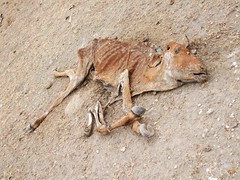We heard today from Mohamed Said, a scientist leading research at the International Livestock Research Institute (ILRI) on pastoral rangelands in eastern Africa, that Kitengela, a Maasai rangeland neighbouring Nairobi, is turning green again after good recent rains following last year's devastating drought, which the livestock herders in Kitengela say killed most of their livestock along with much of the area's wildlife. Interestingly, although already turned green with heavy rains that arrived early in this year, this rangeland remains virtually empty of cattle. It is, rather, full of sheep and goats. Kitengela's Maasai herders have driven all their cattle southeast to Emali. Said and ILRI Maasai partner Nickson ole Parmisa say that the herders will bring their cattle back home, to Kitengela, in another few weeks, when the grass in Kitengela, which is now new and short, has grown taller. Here is a case study in how Africa's pastoral societies continue to work, against all odds, as communities. Late last year, when the impacts of the drought in the Horn of Africa were peaking, Maasai herders from throughout Kenya's Kajiado District descended on Kitengela with their animal herds because they had heard that the Kitengela rangelands had had 'a few showers'. That was true in a few places, but with all the new livestock driven in to this one part of Kajiado, Kitengela was reduced to a dustbowl within a few days. With no forage to eat, the livestock of Kitengela perished soon after the stock that had been trekked in from far places. Many people began to question the wisdom of traditional pastoral movement on Africa's increasingly fragmented rangelands. Now, just a few months later, the Maasai herders of Emali are returning the hospitality, and mercy, shown them last year by their Kitengela cousins. It is now the Emali Maasai who are sharing their green grass (the rains came earlier to Emali than to Kitengela, so the grass at Emali is taller than that in Kitengela) with the hungry animals of Kitengela. While scientists at ILRI and elsewhere debate the wisdom of pastoral mobility (does it still work in today's crowded world?), what apparently is not in doubt is the wisdom of pastoral reciprocity.
ILRI news
Better lives through livestock


This is a carbon copy of what has been happening in Mongolia in recent years. The dorught spells have been so devastating that entire districts moved to the few patches left green. Rains in Mongolia seem to have been reduced to small patchy showers that onyl recirculate local moisture.
Even in places where the density of livestock and people were higher than ever before, local herders still replied that they can not say no to the in-migrants, because ‘maybe next year, it won’t rain here and we’ll be the beggars and go to their places for grass’.
This is indeed no new pattern and contradicts conventional wisdom of ‘economic defendability’. Instead, it seems morality and a sense of reciprocity translate into territiorial arrangements that encourage cooperation. With predicted increased variability and extreme of weather, perhaps such institutional arrangements will have to play a more important role. Let us hope visionary policy makers may encourage and support them.